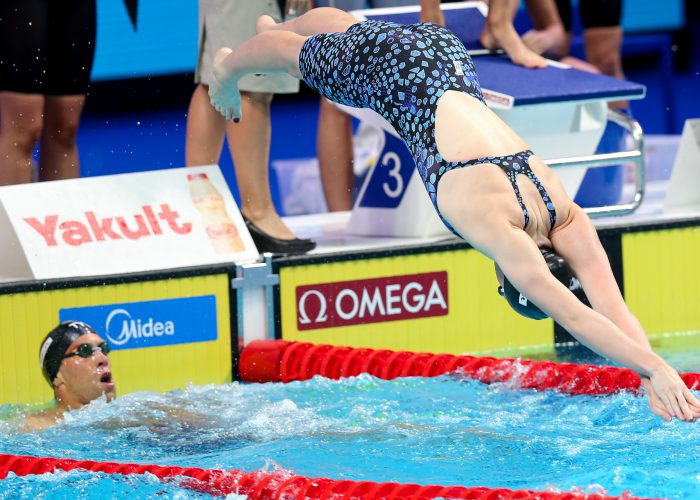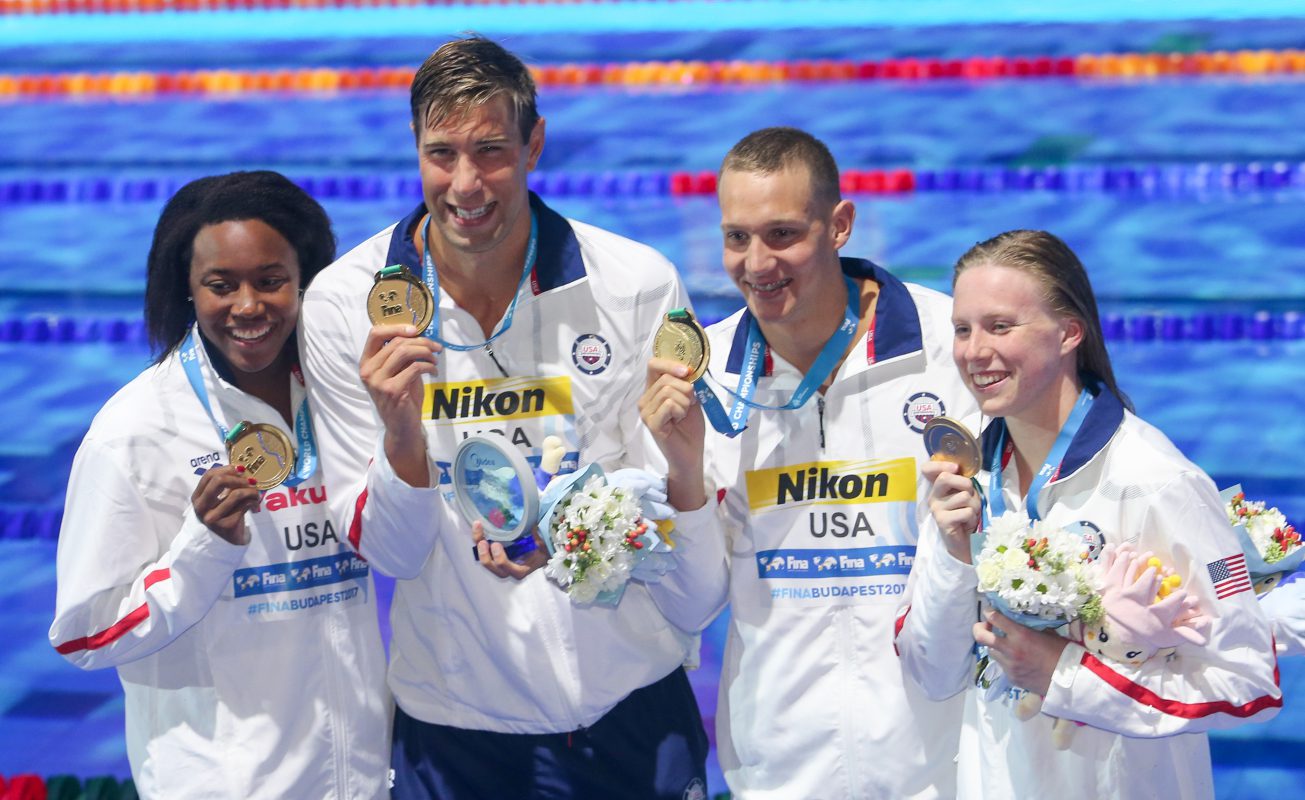No Mixed Feelings on the Mixed Medley Relay

Editorial Coverage provided by ![]()
Morning Splash by David Rieder.
Back in 2015, mixed relays were novelty events when they debuted at the World Championships. Why? Because most swimmers did not grow up swimming mixed relays on a regular basis.
The oft-mighty Americans came out with a patchwork team for the mixed 400 medley relay that included no swimmers entered in the individual 100-meter event of their respective strokes. Australia simply did not field a team for either the mixed 400 medley or mixed 400 free relay.
Two years later, at the next World Championships in Budapest, no one was punting on the mixed medley relay. Why? Because that event had been added to the Olympic program for the 2020 games in Tokyo.
The IOC accepted the mixed relay and not the individual 50s of stroke for the 2020 Games in Tokyo as part of an effort to have a greater percentage of Olympic events (across all sports) include women and to include more mixed-gendered events.
Among swimming insiders, there was skepticism about the relay’s addition because, for all the strategy involved in putting a mixed medley relay team together and however interesting that race can be to watch, it’s still a contrived event.
“That’s how I felt before,” Georgia head coach Jack Bauerle said. “Now I feel completely different.”
When the Olympic event additions were announced in June, the addition of the two new distance events—the men’s 800 free and, in particular, the women’s 800 free—dominated the headlines. For the first time ever, Olympic swimming would feature matching event programs for women and men.
The mixed medley relay was an afterthought—but swimmers and coaches at least seemed willing to give it a chance.
And when they swam the mixed medley relay at the World Championships in Budapest this past July, it was clear how much they enjoyed the events.
In prelims, the U.S. team of Ryan Murphy, Kevin Cordes, Kelsi Worrell and Mallory Comerford broke the world record in the mixed medley relay on their way to the No. 1 seed for finals. After the race, Murphy insisted that, no, he had no unfair advantage racing against women on either side of him, and that he believed that the event absolutely belonged in the Olympic program.
“I think it’s one of the most exciting races to watch. I think a lot of people like watching IM because there’s a lot of lead changes, and then you add in mixing guys and girls, and those lead changes become even bigger. It’s really exciting, really good for the sport,” Murphy said.
“It’s definitely unusual, but it’s a lot of fun, something new and exciting,” Cordes added.
In the final, a wholly-new quartet of Matt Grevers, Lilly King, Caeleb Dressel and Simone Manuel again took down the world record.
“It’s pretty cool that we could have had two teams up there and 1-2’ed it,” Grevers said. “That just shows awesome depth for the USA.”

Matt Grevers & Lilly King — Photo Courtesy: SIPA USA
Sure, that’s a good point about depth, but the Americans swimming the two fastest times of the day also shows one of the potential pitfalls of including the mixed medley relay at the Olympics: it could become a foregone conclusion for the Americans to win gold every time out.
Consider this: At five of the past seven Olympic Games (all except 2004 and 2008), the American women and American men have swept the gold medals in their respective 400 medley relays. So it seems pretty unlikely any other country would have won gold in the mixed medley relay on any of those occasions.
But as one prominent U.S. coach explained, that’s no reason for the Americans to apologize.
“If it’s just another medal for the Americans, then just get better,” Indiana head coach Ray Looze said.
“I think it actually helps other countries. A lot of countries can’t put four people up in the same gender in a medley relay,” he added. “I think it gives other countries more of a chance to beat us.”
Maybe Looze is right, maybe not. While talent and depth are obviously paramount for success in any relay, strategy takes on huge importance in the mixed relays, as countries must decide where to employ their two men and two women.
The U.S. staff at the World Championships had crunched all the numbers and planned out their top two teams—one for finals and one for prelims—only for those plans to change as soon as King smashed the world record in the women’s 100 breast the night before the mixed relay. After that, the math worked out that King should be on the relay.

Photo Courtesy: SIPA USA
The strategy behind putting together a gold-medal relay makes the event compelling for hard core swim geeks, and swimmers thoroughly enjoyed competing in the mixed medley relay, yes. Oh, and spectators love it, too—the back-and-forth lead changes and the idea of watching the best female and male swimmers in the world in the pool at the same time.
Want to watch Grevers, the 2012 Olympic gold medalist in the 100 back, race next to women’s 100 back world record-breaker Kylie Masse? That happened at Worlds. King and men’s 100 breast world record-holder Adam Peaty swam just two lanes apart in the Budapest final.
“We’re still in the entertainment business,” Looze said. “It’s a sport, and when people are paying money for TV or to go buy a ticket, we have an entertainment responsibility.”
Before the IOC picked the mixed medley relay as a new event for Tokyo, outgoing USA Swimming National Team Director Frank Busch had reservations. He had not yet heard much positive feedback from athletes about mixed relays and admitted he was not sure why FINA was pushing for their inclusion on an Olympic level.
A few months later, after the World Championships, he felt much differently.
“Forget where I am on it—the swimmers love it, and the people at home love it, so I think FINA hit it out of the park with that,” Busch said. “If you asked me, I would have probably said, ‘I’m not for them.’ But what the hell—I’m old-school on some things.
“It’s more important that people see it from a different angle, and if it brings something new to our sport in a way which it brings out more and more excitement to the fans and to the kids.”
Even if some traditionalists still aren’t fond of the concept of mixed relays, the mixed 400 medley relay is an Olympic event, and it’s hard to see that changing in the foreseeable future.

- FINA CHAMPIONSHIP PAGE
- ULTIMATE SCHEDULE GUIDE
- QUALIFIED HIGH DIVERS
- MEDAL TABLE
- 2015 WORLD CHAMPIONSHIP RESULTS
- LIVE RESULTS
- OPEN WATER LIVE RESULTS
- PSYCH SHEET
- DAY EIGHT FINALS HEAT SHEETS
- DAY ONE PRELIMS RESULTS
- DAY ONE FINALS RESULTS
- DAY TWO PRELIMS RESULTS
- DAY TWO FINALS RESULTS
- DAY THREE PRELIMS RESULTS
- DAY THREE FINALS RESULTS
- DAY FOUR PRELIMS RESULTS
- DAY FOUR FINALS RESULTS
- DAY FIVE PRELIMS RESULTS
- DAY FIVE FINALS RESULTS
- DAY SIX PRELIMS RESULTS
- DAY SIX FINALS RESULTS
- DAY SEVEN PRELIMS RESULTS
- DAY SEVEN FINALS RESULTS
- DAY EIGHT PRELIMS RESULTS
- DAY EIGHT FINALS RESULTS




Have tended to be ambivalent re mixed relays at World level competitions and maybe still remain a bit that way. Wasn’t thrilled at how they have been “shoehorned” onto the Olympic program without having “served an apprenticeship” of at least one full Olympic cycle at LCM Worlds from which we would have a realistic gauge as to its “take-up” by major nations outside the US but ….. its a done deal.
The cold reality is that USA is the ONLY nations who will realistically medal (at worst) in ALL the “traditional” relays. GBR cannot, neither can CHN or JAP ; CAN men still lag well behind their ascendent women & AUS will probably struggle to go better than 3/6. Furthermore, they are the only nation with sufficient depth to be able to rest their top seeds from the heats in ALL relays; others may be able to do so in some relays but not across the board.
The management of one’s peak resources, particularly when it comes to relays, is a far more cut-throat affair for everyone else except the US. However, Ray Looze’s hypothesis of some nation’s seeing this relay as a better bet IS a very valid one ….. and it is undeniable that some nations will play this option.
However, for the forseeable future, it IS likely that the only way USA would lose this relay is via their own misadventure. Whilst other nations MAY have the upper hand on certain legs with one gender; they are all having to wallpaper over major weaknesses on other legs with both genders.